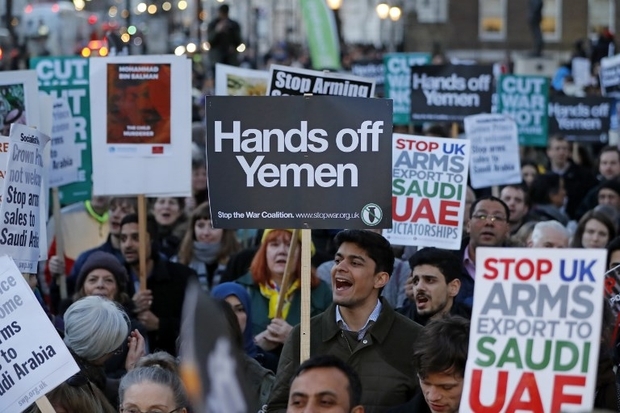Nabil Ennasri
The Saudi crown prince's eagerly awaited visit to London did not go off as well as was hoped. The visit was supposed to lend credibility to the international stature of a crown prince aspiring to one day rule the world's leading oil power.
It turned out instead to be a fierce attack on Saudi Arabia's brutal and amateurish foreign policy in the Gulf state region. The three-day state visit to the UK, which began on 6 March, was organised to both bolster the image of Mohammed bin Salman (MBS), as head of state, and to reinforce the strategic UK-Saudi partnership.
Strategic partners
A long-standing ally, London is seen as one of the Wahhabi kingdom's key strategic partners, second only to the United States and far ahead of France.
The Saudi ruler's visit was quickly derailed, however, as he came under fierce attack for his role in the Saudi-led intervention in Yemen, which began in March 2015 and has since killed thousands of civilians.
Indeed, three years after the launching of Operation Decisive Storm, the situation is no less than catastrophic. Not only has the Saudi army failed to subdue the Houthi rebels, perceived by the Saudis as the armed extension of Iran in the Arabian Peninsula, but the rebels have put up an incredible fight.
A long-standing ally, London is seen as one of the Wahhabi kingdom's key strategic partners, second only to the United States and far ahead of France
On several occasions they successfully launched missile attacks on the outskirts of Riyadh, and they continue to inflict heavy losses on an increasingly discredited and dispirited Saudi army. And for Riyadh, the war has turned into a financial quagmire as well.
Every month, hundreds of millions of dollars – or even billions according to the most alarming estimates – are squandered, while domestic spending remains in the red. In a country plagued by endemic youth unemployment, social unrest is growing.
 A Typhoon jet manufactured by BAE Systems and operated by the Saudi air force (Creative Commons)
A Typhoon jet manufactured by BAE Systems and operated by the Saudi air force (Creative Commons)
But the greatest losses are unquestionably humanitarian. The conflict has killed more than 10,000 people, and the wounded and refugees now number in the millions.
Furthermore, Yemen's catastrophic food supply situation and dilapidated public services have triggered epidemics like cholera. The combination of devastating disease with famine and water shortages has alarmed humanitarian partners and led UN officials to call the Yemen humanitarian crisis the "worst in the world".
The visit of a 'war criminal'
MBS's problems in London were largely due to the fiasco of the Saudi-led intervention in Yemen. Numerous human rights organisations have called for protest marches, forums and other symbolic gatherings to denounce the visit of a "war criminal".
Activists have also rallied near Westminster, the home of the UK parliament.
Seventeen MPs published an op-ed piece criticising Saudi Arabia for its record on human rights and demanding a moratorium on UK arms sales to the Gulf state monarchy. Labour leader Jeremy Corbyn sharply condemned Theresa May's misguided support for the crown prince's policies.
According to the opposition leader, the values of the nation should not be sacrificed to the prime minister's desire to offset the spiralling consequences of Brexit by developing a privileged relationship with the Saudi oil power.
 Demonstrators protest the visit of Mohammed bin Salman, Wednesday, 7 March (AFP)
Demonstrators protest the visit of Mohammed bin Salman, Wednesday, 7 March (AFP)
Because this is indeed one of the unavowed reasons for the crown prince's UK visit: Britain hopes to capture a share of the juicy investments the Saudi authorities are getting ready to move forward on.
But discreet discussions on the forthcoming public listing of the all-powerful state oil firm, Saudi Aramco, were a particularly important part of the trip. Aside from this, it was about selling arms.
Vision 2030
The European consortium that manufactures Typhoon fighter jets, of which the British group BAE Systems is a partner company, has welcomed a memorandum of intent signed with Riyadh for the purchase of 48 fighter aircraft.
The announcement came at the end of the Saudi prince's visit to the UK and could lead to an order worth over $10bn.
MBS and his advisors are also seeking foreign investment as part of Vision 2030, an ambitious plan to liberalise the kingdom's economy through the privatisation of state-held concerns.
Scheduled for later this year or early 2019, the public listing of the Saudi oil giant is expected to value it at $2000bn with 5 percent of the company's stock, worth $100bn, floated. Among the few details that remain to be settled - the stock exchange where Aramco will be listed.
One thing we do know is that the British government was hoping to convince the Saudi royal to choose London over New York, a city he will soon be visiting as part of an extensive tour of the United States.
Given the less than warm welcome he received in the UK, it is highly unlikely the Saudi crown prince will have many fond memories of the heavy weather in London.

No comments:
Post a Comment